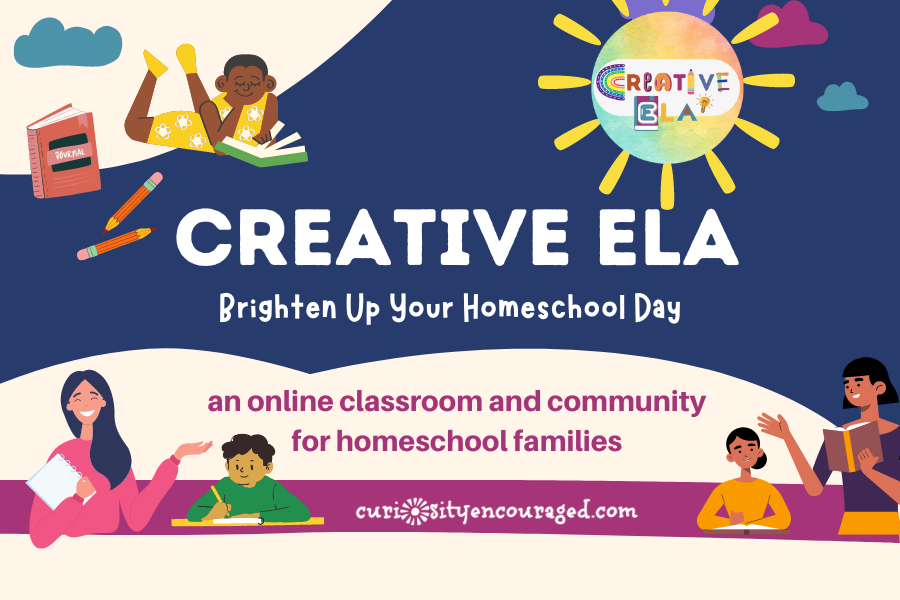
Everywhere we go my daughter finds insects she wants to hold and examine. My son loves to take things apart so he can put them back together again. Both love the endless opportunities a cardboard box offers and are happy to talk for hours about dinosaurs or show me a magic trick. These things they love and do matter. How I as their mom and teacher respond to their interests matters as well. My response can very much factor into furthering their curiosity or squashing it. My response and their freedom to explore their interest can foster a love of learning or take it away.
How do we encourage their love of learning?
We stop and look at the beetle with her, we hand over the screwdriver, save boxes, watch dinosaur documentaries with them, and participate in a lot of magic tricks.
It’s not hard, but it takes intention and care. We have to prioritize what our children think is important.
We pay attention to when and how learning happens.
- We learn by experience. We touch something hot and learn it hurts or hold a kitten and feel love.
- We eventually learn through repetitive instruction. How many times have you said, “Look both ways before you cross the street.”
- We learn by watching and listening. My children know all sorts of “choice” words thanks to my inability to stop cursing (ahem). Books, audiobooks, lectures, tv/movies, and concerts are of course great teachers too.
We look at how our children learn best.
- Does your child need actual experiences? Hands-on experiments, art classes, math manipulatives?
- Does your child learn best with repetition? Do they like to read the same book over and over, practice their multiplication tables by reciting them, or do they need a tool like flashcards to keep facts in their memory?
- Does your child learn best through books, reading or listening? Are they visual or auditory learners?
My kids learn best by doing and listening. They love hands-on projects and listening to read-alouds or books on cd.
We pay attention to our children’s interests.
We learn when we’re interested. Interests get us to dive deeper, ask questions, and find answers.
We also learn (sort of) when we’re not interested or forced to learn. This is when we learn how to hate or avoid learning. (Know anyone who hid a novel in their math book or who hates to write. I bet they have stories about being bored, pushed, or were told they had to write essays about subjects they could have cared less about.)
How to Nurture a Love of Learning
NOTE: What follows are WAYS to nurture a love of learning, not THE WAY. There isn’t a formula, curriculum, or a sure-fire way to help our kids love to learn.
AND please know- Nurturing a love of learning does not mean FUN, laughter, blissed-out joy all day long. Challenges and learning go hand in hand. That’s how we learn. If we already know how to do something perfectly, are we learning?
A frustrated child is not necessarily a child who is not interested or a child who doesn’t want to learn. Often, they are a child who is trying to figure something out, which we all know can be super annoying sometimes.
Observe- offer- facilitate- sometimes wait- repeat.
- Pay attention to what children/students are interested in.
- Help kids find books, movies, games, and activities that play into their interests.
- Offer outings, classes, and time to delve into what you’ve found.
- Strew- leave books and other things where they can find them and catch their attention.
- Recognize everything we think they might love may not be a good fit, and try not to give up or take it personally.
- Keep listening, offering, making space for their interests.
Find interest in our children’s interests.
- Play the game, read the book, watch the movie they love.
- Ask questions about their interests. Even if the interest is not shared, listen for what they love.
- Answer questions. Even if you could care less, take the time to share what you know or research what they are wondering about.
- Get excited and curious with them. Let yourself wonder and learn too.
Make Learning Relevant
When children have to know something, figure out how to make the information they have to know interesting and meaningful.
- Play games.
- Find a mentor, someone who is passionate about the subject or can offer a new perspective.
- Take the learning outside, to a coffee shop, somewhere fun.
- Find movies, field trips, music, picture books, and seek other creative ways to access information.
- Don’t be afraid to head back to the children’s department. Watch the School House Rock or Magic School Bus.
Make Learning About Your Child
Say yes to messy, to projects taking a lot of time, to doing the same thing over and over.
- Repetition is how a lot of us learn. If children want to listen to the same audiobook, play the same game, or only learn about dinosaurs, let them. What are they hurting?
- Hurry up and get it done does not lead to learning. Rushing leads to a child realizing the thing that is being asked of them, is not worth their time.
Let Kids Go at Their Pace
Be okay when children aren’t ready to learn what others think they need to know.
- When the voices in our head, family members with good intentions, friends, strangers, the grocery store clerk question if our kids know enough, it’s important to breathe, deeply. We must remind ourselves, no one cares or asks how old we were when we learned to read or how high we can multiply in our head.
- Learning is not a race.
- If a child wants to learn something or needs to and is struggling, make sure play, interest, a safe environment, and low-pressure practice are offered.
Nurturing Means to Encourage, Not Force
Force, even when backed by good intentions, does not lead to an enjoyment of learning or actual learning. It might equal minimal engagement, a child trying to please, but eventually, the other pieces, the child being developmentally or emotionally ready, interested, and a supportive learning environment are necessary before mastery can begin to occur.
It is easy to get into a power struggle with our children when we think they need to do or know something and they don’t agree or aren’t ready. If we’re trying to help a child learn and it leads to a struggle beyond a normal challenge of learning something new, chances are they are either not ready or need a different approach.
After working with children for twenty years, I’ve learned it doesn’t matter if children are in school or learn at home, and it doesn’t matter if they are 3 or 23, when we encourage and nurture a child’s natural curiosity, their love of learning, we help them learn.
We can nurture their love of learning anytime, anywhere. When we play with our children, show interest in what they are excited about, take the time to listen to their questions, and help them find answers, we build curiosity and help their love of learning grow.



















